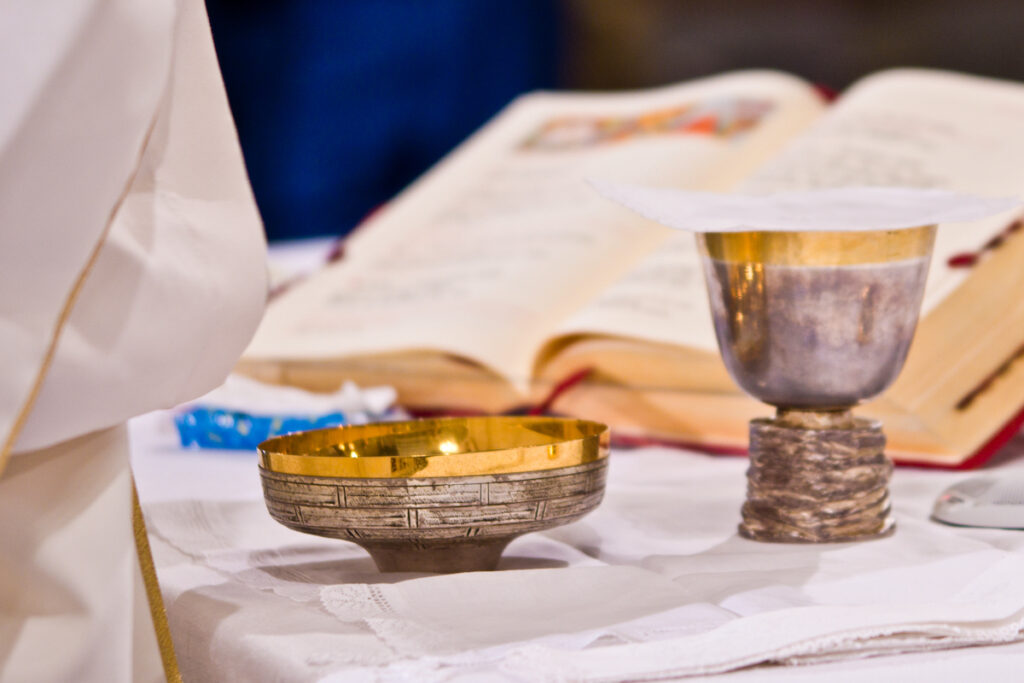Question:
I was taught that for a valid Mass, the priest must pray the exact prayer of consecration as written in the approved liturgical books, raise the host and chalice high, and either bow deeply or genuflect.
Our priest barely raises them above his chest, does a quick perfunctory bow and basically makes up the words as he goes along. No two consecrations are the same. He doesn’t use the book, and the words he says are not the words of Jesus at the Last Supper.
When confronted about this, he says that he speaks from the heart and that the Mass is more meaningful that way. I’m not sure that I’m even receiving the body and blood of Christ after his consecration — or if Jesus is truly present in the tabernacle afterward. Many of our parishioners are wondering the same thing. (City and state withheld)
Answer:
I wouldn’t worry about how high the priest holds the host and chalice. As an older priest who has had rotator cuff surgery on both shoulders, I can barely get my arms above the top of my head — and this does not affect the validity of the Masses I celebrate. But the words of consecration are a different matter entirely, and on this the Church has spoken specifically.
In the papal bull “De Defectibus,” issued by St. Pius V in the 16th century when ratifying the Council of Trent, we read: “If the priest were to shorten or change the form of the consecration of the body and blood, so that in the change of wording the words did not mean the same thing, he would not be achieving a valid sacrament. If, on the other hand, he were to add or take away anything which did not change the meaning, the sacrament would be valid, but he would be committing a grave sin” (No. 20).
In the instruction “Redemptionis Sacramentum,” issued in 2004 by the Vatican’s Congregation for Divine Worship and the Sacraments, we are reminded: “It is not to be tolerated that some priests take upon themselves the right to compose their own eucharistic prayers or to change the same texts approved by the Church, or to introduce others composed by private individuals” (No. 51).
And the General Instruction of the Roman Missal, the Church’s official “guidebook” on the liturgy, repeats that same caution: “The priest will remember that he is the servant of the sacred liturgy and that he himself is not permitted, on his own initiative, to add, to remove or to change anything in the celebration of Mass” (No. 24).
Question:
I am a retired Catholic school principal and the product of 18 years of Catholic school education. It troubles me greatly that the Church routinely “assigns” sins to people. Missing Mass on Sunday is one example.
Catholic teaching says that the subject matter of a mortal sin must be gravely immoral, the individual must agree that the action is gravely immoral, and the individual must choose the action with full freedom while agreeing that it is gravely immoral.
In my experience, any number of people may not agree that attending Mass on Sunday is a grave matter. In these cases, they cannot be assigned a mortal sin. (Ballston Lake, New York)
Answer:
The Church has spoken clearly on the obligation of a Catholic to attend Mass on Sundays and holy days.
The Catechism of the Catholic Church says, “The Sunday Eucharist is the foundation and confirmation of all Christian practice. For this reason, the faithful are obliged to participate in the Eucharist on days of obligation, unless excused for a serious reason (for example, illness, the care of infants). … Those who deliberately fail in this obligation commit a grave sin” (No. 2181).
I agree with you that gravity of matter is just one of the three necessary conditions for a mortal sin — the others being complete consent of the will and full knowledge of the sinful character of the act or omission.
Where I disagree with you, though, is your apparent belief that an individual can ignore the Church’s teaching and simply decide for himself what is a sin and what isn’t.
A Catholic has to be guided by the Church, and the Church has already spoken on the gravity of missing Mass.
Perhaps No. 1859 of the catechism is relevant here: “Mortal sin requires full knowledge and complete consent. It presupposes knowledge of the sinful character of the act, of its opposition to God’s law. It also implies a consent sufficiently deliberate to be a personal choice. Feigned ignorance and hardness of heart do not diminish, but rather increase, the voluntary character of a sin.”
I shudder to think what would happen if your worry about “assigning sins” were applied to such matters as fidelity in marriage. Certain circumstances, of course, can excuse one from attendance at Mass on a particular Sunday.
The current pandemic is a notable example, and the catechism mentions illness and the care of infants, but others might be unavoidable work obligations, lack of transportation or inclement weather sufficient to put one’s safety at risk.

